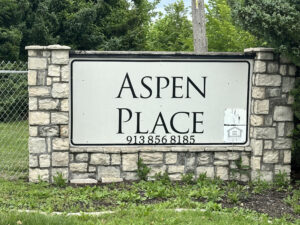
A class-action lawsuit was filed by Bell Law, LLC, on May 16, 2025, against the owners and managers of Aspen Place Apartments in Gardner, Kansas, alleging long running neglect of the property’s plumbing system, which led to its condemnation and the displacement of approximately 700 residents. The lawsuit seeks monetary damages on behalf of current and former tenants for issues including lack of water, sewage backups, mold, and unfair lease terms.
The plaintiffs, Aric Cooperwood, Anthony Fellows, and Rachel Fellows, assert that the defendants—KDR AP, LLC; KDR REALTY, LLC; Axiom Property Management, LLC; Axiom Property Management II, LLC; Axiom Equities, LLC; Axiom-Aspen, LLC; Axiom Equities Investments, LLC; and Axiom Family of Companies, LLC—were aware of the deteriorating conditions but failed to make necessary investments in repairs.
The complaint details a history of water-related problems at Aspen Place, which was finally condemned by the City of Gardner on May 8, 2025, due to its inability to supply residents with water. Residents were given short notice to vacate their homes. The lawsuit highlights that the city had been aware of the issues for an extended period, issuing minor citations that did not address the magnitude of the problem.
Key allegations in the lawsuit include:
- Negligent Property Management: Defendants are accused of failing to maintain the property’s plumbing system, leading to persistent water outages, low water pressure, burst pipes, and sewage issues.
- Unconscionable Lease Terms: The complaint alleges that KDR, the current owner, passed on the cost of its own general liability insurance to tenants, required them to purchase additional outsized liability policies with KDR as an insured, and charged a “water-usage fee” based on the number of residents rather than actual usage. Lease terms also allegedly held tenants financially responsible for water damages from frozen pipes, even though KDR was aware of the systemic fragility of the plumbing.
- Deceitful Practices: KDR is accused of marking maintenance requests as “complete” without performing the work and coercing tenants to delete negative online reviews in exchange for lease renewals.
- Failure to Disclose: The lawsuit claims that systemic water problems were not disclosed to residents before they entered leases.
The class-action lawsuit asserts five causes of action:
- Violations of the Warranty of Habitability: Defendants breached express and/or implied terms of lease agreements by failing to provide habitable living quarters, entitling plaintiffs and the class to actual and consequential damages, including back rent and punitive damages.
- Breach of Contract and Statutory Duty to Materially Comply with Lease and to Provide Habitable Housing (K.S.A. § 58-2559(b)): Defendants failed to comply with rental agreements and applicable building/housing codes materially affecting health and safety, leading to damages in the form of all rents paid during the class period.
- Failure to Provide Essential Services (K.S.A. § 58-2563): Defendants deprived tenants of essential services, including reliable water and timely remediation of water-related issues, entitling plaintiffs and the class to recover up to one-and-a-half times the periodic rent, plus punitive damages.
- Negligence: Defendants, as owners and managers, breached their duty of reasonable care in providing habitable housing, including clean running water and timely maintenance, and failed to disclose poor conditions.
- Violations of the Kansas Consumer Protection Act (KCPA): Defendants allegedly engaged in deceptive and unconscionable acts and practices by concealing material facts, misrepresenting conditions, and taking advantage of tenants, entitling the class to actual damages or civil penalties, as well as costs and attorneys’ fees.
The proposed class includes all persons who resided at Aspen Place on or after May 16, 2020 (five years prior to the complaint’s filing) through the date the class is certified. The lawsuit estimates well over a thousand class members, given the 188 units and resident turnover. The plaintiffs demand a jury trial for all triable issues.

